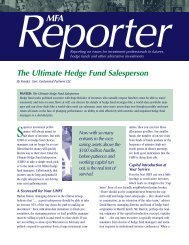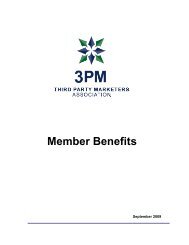letter - 3PM - Third Party Marketers Association
letter - 3PM - Third Party Marketers Association
letter - 3PM - Third Party Marketers Association
Create successful ePaper yourself
Turn your PDF publications into a flip-book with our unique Google optimized e-Paper software.
The <strong>Third</strong> <strong>Party</strong> <strong>Marketers</strong> <strong>Association</strong>contribute to (or solicit contributions for) officials of any government entity from which any adviserthat hires them is seeking business. We further believe that it would be reasonable to require <strong>Third</strong><strong>Party</strong> <strong>Marketers</strong> to fully disclose any contributions made to public officials or other politicallyoriented persons with the ability to influence the investment process.<strong>3PM</strong> believes that pay‐to‐play practices can manipulate the market for advisory services by creatingan “uneven playing field” among investment managers. This uneven playing field can and hasdisadvantaged smaller advisers, may have jeopardized investment performance by having a big firmfocus, and may have impeded the introduction and development of new investment products andstrategies. It is important to note that this proposed ban will certainly have an immediate andsubstantial negative impact on smaller investment managers, which includes woman‐ and minorityownedfirms as well as other emerging managers. These firms already face a significantdisadvantage when competing against large global multi‐product firms and the significant restrictionof their sales and marketing options can only further, negatively affect their viability.We also note that the proposed rule suggests that solicitation of governmental entities byemployees of “related entities” may be allowable because of “efficiencies” that may be captured bythe investment adviser. While the proposed suggestion may be well intended, these “efficiencies”would only benefit large organizations, some of which may include third party marketing activities.This preferential treatment would also seriously discriminate against small and emerging firms, aswell as international investment advisers who do not have a presence within the US. As mentionedearlier, we strongly believe that the Commission has an obligation to consistently apply rulesregardless of their affiliation and as such object to any preferential treatment being provided tolarge organizations who engage in third party marketing. Instead of leveling the playing fieldbetween small and larger firms, a ban on <strong>Third</strong> <strong>Party</strong> <strong>Marketers</strong> would create an environment thatfavored large investment managers with internal marketing staffs.Section III – Cost / Benefit AnalysisThe Commission requests comment on the effects of the proposed rule and rule amendments onpension plan beneficiaries, participants in government plans or programs, investors in pooledinvestment vehicles, investment advisers, the advisory profession as a whole, government entities,third party solicitors, and political action committees. In addition, we request data regarding ourassumptions about the number of unregistered advisers that would be subject to the proposed rule,and the number of covered associates of these exempt advisers. As discussed below, section 202(c)(1)of the Advisers Act does not apply to proposed new rule 206(4)‐5 or the proposed amendments torule 206(4)‐3. Nonetheless, in the context of the objectives of this rulemaking, we are interested incomments that address whether these proposed rules will promote efficiency, competition andcapital formation. We solicit comment on the effect the proposed rule would have on the market forinvestment advisory services and third‐party solicitation services.Page 12




